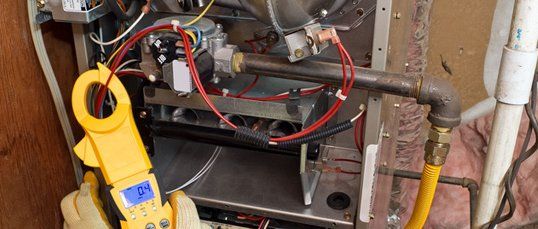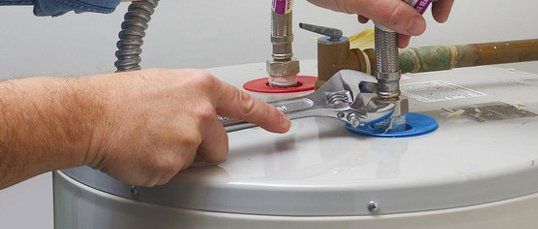Hints About Water Heaters and Electrical Fittings
Able Service offers this as a safety page focusing on your safety because we're professional and we care!
What to do if you smell gas?
- Do not try to light any appliance
- Do not touch any electrical switch and do not use any phone in your building
- Immediately call your gas supplier from a neighbor's phone. Follow the gas supplier's instructions
- If you cannot reach your gas supplier, call the fire department (9-1-1)
- Do not return to your home until authorized by the gas supplier or fire department
- Improper installation, adjustment, alteration, service or maintenance can cause injury, property damage; in that case refer to this manual
- Installation and service must be performed by a qualified installer, service agency or the gas supplier

Water Heater Temperatures
Water temperature over 125°F can cause severe burns instantly or death from scalds.
- Children, disabled and elderly are at the highest risk of being scalded
- See instruction manual before setting the temperature of the water heater
- Feel the water before bathing or showering
- Temperature limiting valves are available

Electrical Emergencies
Electrical work is not for amateurs; it's unique and must be done exactly right. Anything neglected or hooked up incorrectly could be a fire or shock danger. Just because you can buy electrical materials off the shelf at a home center doesn't mean you can install them correctly. Hire a qualified electrician for any electrical that needs to be done.
Install only the bulbs rated for a light fixture. If you plan to make electrical repairs of any kind, first turn off the main breaker or the individual breaker or fuse that serves the circuit you're working on. Check the circuit with a voltage tester to be sure it's off.
When a fuse blows or a circuit breaker trips, you should always determine exactly what caused the overload or short circuit and correct the condition before inserting another fuse or reactivating a breaker.
You may reduce the electric consumption used on that circuit by unplugging a few appliances or moving them to another room. If this doesn't help, have a professional electrician inspect the system to determine why it's overloading. To avoid electric shock during a lightning storm, unplug appliances before the storm hits and avoid using a phone or fax.
Smoke and Carbon Monoxide Detectors
These detectors could save your life. For maximum protection, place a smoke alarm on every floor and in an area outside each bedroom. Carbon monoxide (CO) detectors should be placed near gas appliances including water heater and furnace areas. Test each detector once a month and replace batteries annually. Whenever you vacuum or dust, don't forget the vents on the detectors where dirt can build up causing any sort of malfunction.

Avoid Electrical Shocks
If you assume any outside downed lines are electrically charged, then stay far away from them and call the power company and 911. If someone comes in contact with an indoor electric current, shut off the power at the source like your fuse box or circuit breaker panel.
If you cannot disconnect the electrical current, don't make direct contact with the victim. Free the person using non-conductive material such as dry wood, plastic or fiberglass. Be sure you're standing on a dry surface and that your hands are dry. Once the victim is free, call 911. Make sure help is on the way and begin cardiopulmonary resuscitation (CPR) if needed and you know how to do it.
Call us to learn more about our emergency services.
502-633-4549
We do house calls!


